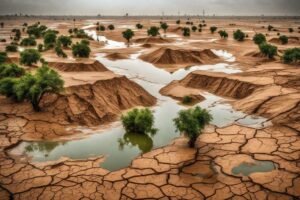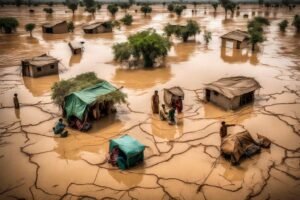Climate Change in Pakistan
Climate change in Pakistan is part of the global crisis that affects countries across the world. Situated in South Asia, Pakistan is particularly vulnerable to the effects of climate change due to its geographical location, socio-economic conditions, and limited capacity to adapt to environmental changes. In recent years, Pakistan has witnessed a surge in extreme weather events, altered rainfall patterns, and rising temperatures, all of which are indicative of the looming climate crisis. This article explores the impact of climate change in Pakistan and the measures being taken to minimize its effects.

Climate change in Pakistan
The Impact of Climate Change in Pakistan
- Melting Glaciers: One of the most alarming consequences of climate change in Pakistan is the rapid melting of its glaciers, particularly in the northern regions. The Himalayan and Karakoram glaciers are a critical source of freshwater for Pakistan’s rivers, and their retreat threatens the country’s water supply. Reduced glacier meltwater leads to water scarcity, affecting agriculture, hydropower generation, and overall livelihoods.
- Erratic Monsoon Patterns: Pakistan relies heavily on the monsoon season for its agricultural production. However, climate change has disrupted monsoon patterns, resulting in irregular rainfall and prolonged droughts in some areas. This has led to crop failures, food insecurity, and economic hardship for many rural communities.
- Increased Heatwaves: Pakistan has been experiencing more frequent and severe heatwaves due to rising temperatures caused by climate change. These heatwaves have had devastating consequences, including heat-related illnesses and deaths. Urban areas, where the heat island effect amplifies temperatures, are particularly vulnerable.
- Coastal Vulnerability: Pakistan’s coastline along the Arabian Sea faces multiple climate change-related threats. Rising sea levels and more intense cyclones pose significant risks to coastal communities and infrastructure. Coastal erosion, saltwater intrusion, and the loss of mangrove forests exacerbate the vulnerability of the region.
- Biodiversity Loss: Climate change impacts ecosystems and biodiversity in Pakistan. Shifts in temperature and precipitation patterns disrupt habitats, endangering native species. This biodiversity loss not only affects the environment but also impacts livelihoods that depend on natural resources.
Mitigation and Adaptation Efforts
- Reforestation and Afforestation: Pakistan has initiated tree planting campaigns to combat deforestation and increase forest cover. The Billion Tree Tsunami Project in Khyber Pakhtunkhwa, for example, aims to plant a billion trees in the region. Such initiatives help sequester carbon, mitigate climate change, and restore ecosystems.
- Renewable Energy: Pakistan is gradually shifting toward renewable energy sources, such as wind and solar power, to reduce its reliance on fossil fuels. This transition not only reduces greenhouse gas emissions but also provides opportunities for sustainable development and job creation.
- Climate-Resilient Agriculture: To address the challenges of erratic rainfall and water scarcity, the government is promoting climate-resilient agricultural practices. This includes the introduction of drought-resistant crop varieties and improved irrigation techniques.
- Disaster Preparedness: Efforts are being made to enhance disaster preparedness and response mechanisms. Early warning systems and disaster risk reduction strategies are being implemented to protect vulnerable communities from the impacts of climate-related disasters.
- International Cooperation: Pakistan is actively participating in international climate agreements and seeking assistance from the global community to address climate change challenges. Collaborative efforts are essential to mitigating the effects of climate change on a global scale.

Conclusion
Climate change in Pakistan is a critical issue that threatens the country’s socio-economic development, environmental stability, and the well-being of its people. The nation is taking steps to mitigate and adapt to these challenges, but concerted efforts, both domestically and internationally, are needed to address the root causes of climate change and its far-reaching consequences. Pakistan’s experience serves as a stark reminder that climate change is a global problem that requires collective action and commitment to safeguard the planet for future generations. As the Pakistani Education System can not teach a child about the climate change so the Govt. must have to include such knowledge in our education system
8 Responses
[…] due to climate change in Pakistan there are a lot of changes occurring in the diet. Creating a weight gain diet plan requires careful […]
[…] climate change in Pakistan affects life, in the current year (2023) eye flu is common. Allergic conjunctivitis in Pakistan is […]
[…] School Dropouts in Pakistan […]
An interesting topic and I’m glad to come across your page where I found some helpful insights. Check out my website Article Sphere too, if you need additional resources about SEO.
Hurray, this is just the right information that I needed. You make me want to learn more! Stop by my page UQ8 about Thai-Massage.
An excellent read that will keep readers – particularly me – coming back for more! Also, I’d genuinely appreciate if you check my website FQ4 about Airport Transfer. Thank you and best of luck!
I don’t think the title of your article matches the content lol. Just kidding, mainly because I had some doubts after reading the article.
Can you be more specific about the content of your article? After reading it, I still have some doubts. Hope you can help me.